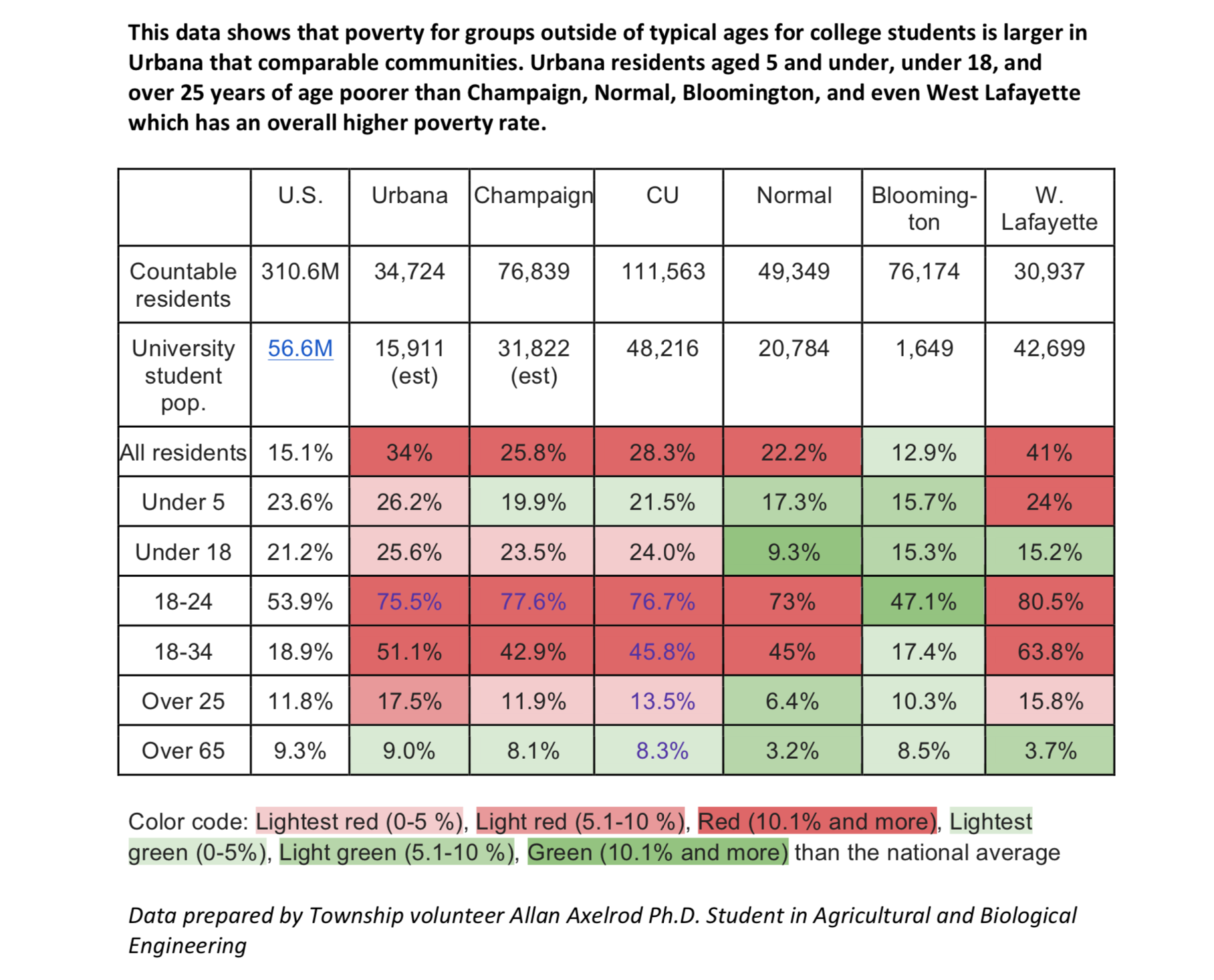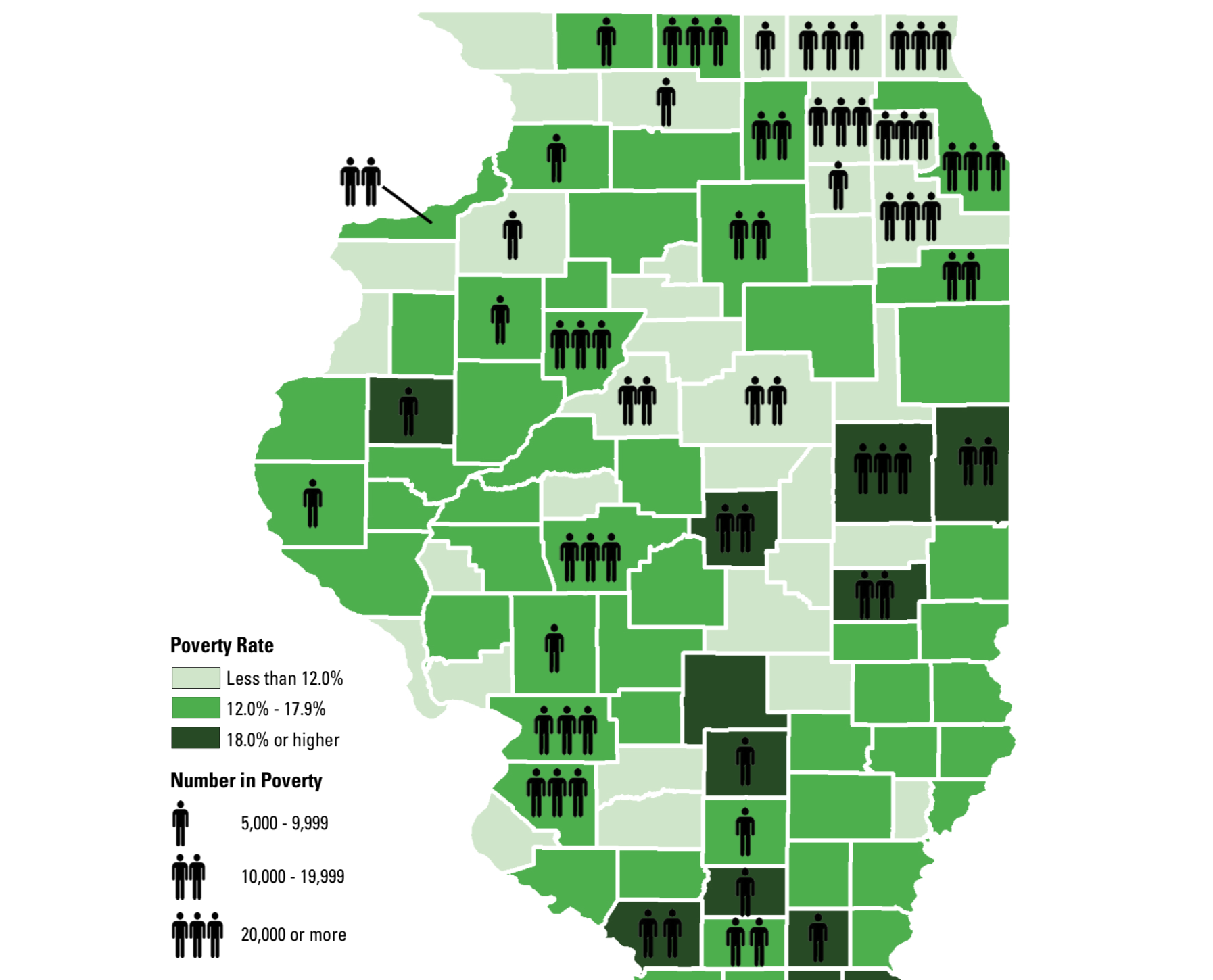Champaign County has a long history of being among the poorest counties in the state: In 2013, Champaign County was the 3rd poorest county in Illinois; in 2015 it was the 10th poorest. Just last year, the poverty rate in Champaign County was estimated to be at 21.4%, with well over 20,000 people living in poverty. (Poverty is often delineated by three categories: extreme poverty, poverty, and low income. For a single person, the federal poverty guideline for 2019 is $12,490 per year. Extreme poverty is about half of that.)
Not having enough money is a problem many face, but to live in poverty or extreme poverty presents a host of other issues. We see the manifestations of poverty in food insecurity, crime, drug use, and school truancy. We see it in homelessness and in housing discrimination. When you don’t have enough money to cover all of your expenses, you are forced to make impossible decisions: Food or rent? Utilities or transportation to work? Your credit score suffers, and improving that is practically insurmountable if you don’t have the means to pay off debts. If you aren’t able to save any money, it makes finding a decent place to live difficult, as many landlords not only offer leases based on credit score and history of criminal convictions, but also often require a substantial downpayment in addition to the first month’s rent.
In early February, Cunningham Township Supervisor Danielle Chynoweth spoke to the Urbana City Council about rates of poverty in Urbana. The township first presented a report on poverty in November of 2018; members of the council inquired about the effect of college students distorting the data. The February Cunningham Township report was a deeper dive, specifically addressing the non-college age subset living in Urbana.
According to the data collected and consolidated by U of I PhD student and Cunningham Township volunteer Allan Axelrod, 17.5% of Urbana residents over the age of 25 live in poverty. 26.2% of Urbana residents under the age of 5 live in poverty. These numbers are much higher than Champaign, Bloomington, Normal, and West Lafayette, Indiana, all university towns of a similar size. Both Urbana’s and Champaign’s numbers are well above the national averages.

The News-Gazette reported on the February Urbana City Council meeting, and one thing attracted our attention more than the data: the responses from Urbana mayor Diane Marlin and Township board member Bill Brown. Both indicated that they don’t think Urbana “feel[s] like it’s a poor community,” and that the “very high student population” likely affects the poverty numbers.
We found these responses troubling. “Feelings” have no business being used as a criterion to measure poverty. You can absolutely have an emotional response to terrible things in the world, but you cannot use an emotion to measure a data point. If you live in a comfortable place with heat and electricity, and visit restaurants and workplaces and friends’ homes with the same, of course you won’t “feel” like you live in a poor place. That’s how capitalistic segregation works — those with don’t have to regularly see or engage with those without. Despite what American society indicates, poverty is not a personal failure. Poverty is the byproduct of systems meant to create a stratified society. These systems and institutions — capitalism, racism, sexism, classism — are discriminatory by design.
There are indeed poor students living in Urbana and attending the U of I and Parkland. Those students, regardless of age or degree status, are still residents of Urbana. They are our neighbors, our friends, our colleagues. Just because they aren’t living here for their entire lives, is okay for them to live in poverty? Is poverty the price of education?
Cunningham Township brought this data before the city council to initiate change. Chynoweth has offered several concrete suggestions to help poor members of the Urbana community. These are viable options, and should be enacted by the city.
1. Support the community-wide effort to ensure everyone has a safe place to sleep for the night. Right now homeless women with children have absolutely no same day shelter to go to. They are literally stuck sleeping in cars, staying in unsafe structures, or trading their bodies for a place to sleep.
2. Increase funding to social service agencies. The City of Urbana cut its portion of social service funding from $200,000 to $75,000 in recent years. That funding should be restored as soon as feasible, starting with small steps up over the years.
3. Remove laws that punish the poor such as laws against dumpster diving (found here and here in the municipal code) and loitering.
4. Enforce the laws that are meant to protect the poor:
- a) In Urbana, landlords are prohibited from charging more than 5% of monthly rent in late fees (so $35 is the max for a $700 apartment) and yet our office sees dozens of leases that violate this provision. We will not place families into housing with illegal leases, but the City could do much more to get the word out and enforce this law.
- b) In Urbana, it is illegal to discriminate in housing based on student status, whether you have children, or criminal conviction history – and yet many landlords do. The City has a Human Relations Commission which should be much more proactive about educating the community about its rights.
We also have a few suggestions for ways to address this complex, deeply embedded problem in both Urbana and Champaign, though we acknowledge that some of these suggestions may only treat the symptoms and not the root cause. Many of these suggestions are fairly broad, but there are cities and towns that have implemented similar programs, so this type of work can be done.
Make MTD free for Illinois LINK cardholders
- For those without reliable transportation, the MTD system is essential. Alleviate the burden of cost (even if it is relatively small) so that people can get where they need to go.
Give homeless people a place to live, for free
- Yes, this is an expensive endeavor, but it’s actually cheaper in the long run when you consider the costs of policing and emergency room visits. (You can read up on the idea here.) When the basic need of consistent shelter is not met, it’s nearly impossible to get ahead. Imagine that you could allow someone the literal and psychic space to take a shower, sleep safely, find a job. That person is simply getting a boost to the lowest common rung to achieve basic success. Free housing isn’t intended to be a lifelong solution; it’s a means to get people on their feet so they can afford to move out and support themselves.
Work with the U of I to address student poverty
- This is a big topic, and one that requires a lot of collaboration between the cities of Urbana and Champaign and the University. Informative programming is the first step in shoring up human resources — people, ideas, groups willing to volunteer — and putting a name to the problem. If the problem is never named, it can’t be addressed.
Encourage more enrichment programming for kids
- The link between poverty and educational and health outcomes has long been established. When kids are stressed out, tired, hungry, depressed, and sick, they can’t learn and they can’t make good decisions. What if there were more after school and community-wide enrichment programs, offering a safe and engaging environment, where young children have an opportunity to act and behave like kids? They can tap into a part of themselves they’ve shut down, or develop interests in subjects they didn’t even know existed. What happens when a bunch of kindergarteners learn yoga? Or martial arts? Or plant a vegetable garden?
Yes, everything costs money. Yes, these suggestions will cost money. At the municipal level, money can be reprioritized and earmarked to address these solutions. But the burden is not the city’s alone; there is plenty of corporate and private money in Champaign County that can be put to philanthropic use. Religious organizations can work together to do more to help their congregations. We have to find ways to lift up all of our neighbors, not just those who share our tax bracket. But in order for any of this to be done, we have to acknowledge the problem, and we have to be able to trust that our elected officials will acknowledge it as well.
Smile Politely’s Editorial Board is Nicole Anderson Cobb, Jessica Hammie, Julie McClure, and Patrick Singer.
Top image screenshot from Heartland Alliance Poverty Report








